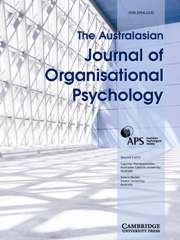Article contents
Applying Organisational Theory to Isolated, Confined and Extreme Settings
Published online by Cambridge University Press: 23 February 2012
Abstract
Research on person–environment fit theory has largely developed within the context of people and organisations in urban settings. There has been little research of this kind within organisations in isolated and confined contexts. The purpose of this article was to examine the implications of person–environment fit theory within the context of the complementary fit and supplementary fit paradigm (Muchinsky & Monahan, 1987), for people working in isolated and remote organisational settings. Using a sample of Antarctic personnel, this study examined the extent to which psychological need fulfilment and subjective fit with Antarctic station culture were equally important in predicting individual attitudes, including satisfaction with being an expedition member, intent to return and willingness to recommend the Antarctic to others. Results showed that gender and subjective fit with Antarctic station culture predicted satisfaction with station membership. Results also showed that subjective fit predicted willingness to recommend the Antarctic as a good place to work, while psychological need fulfilment was not a predictor of any of the outcome variables examined. Results suggest that outcomes such as intention to return (or to stay) may be less relevant in such settings because of the unique and temporary nature of the experience and the work. Results also attest to the need for further development of organisational theories, including person–environment fit theory, using data collected from organisations in isolated, confined and extreme environmental contexts.
- Type
- Articles
- Information
- Copyright
- Copyright © Cambridge University Press 2008
- 2
- Cited by


